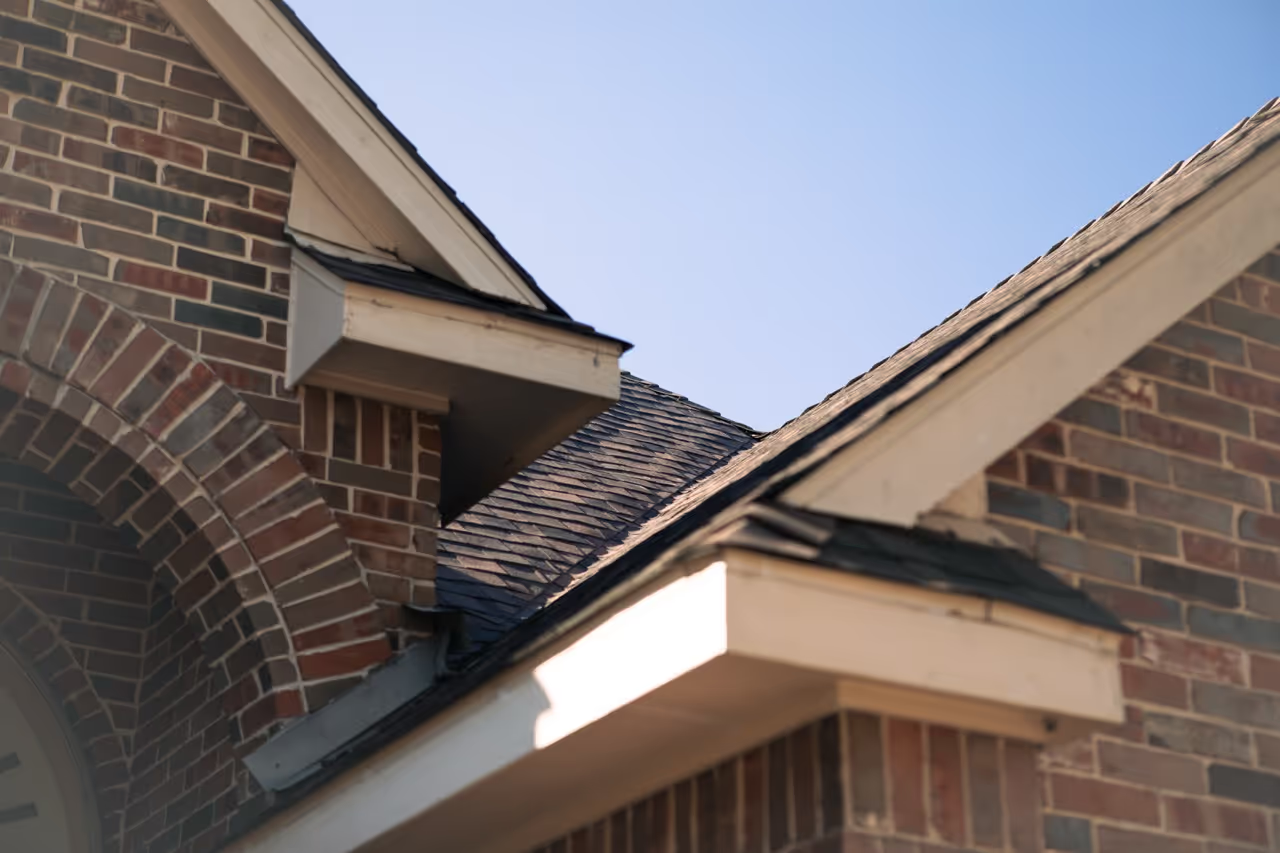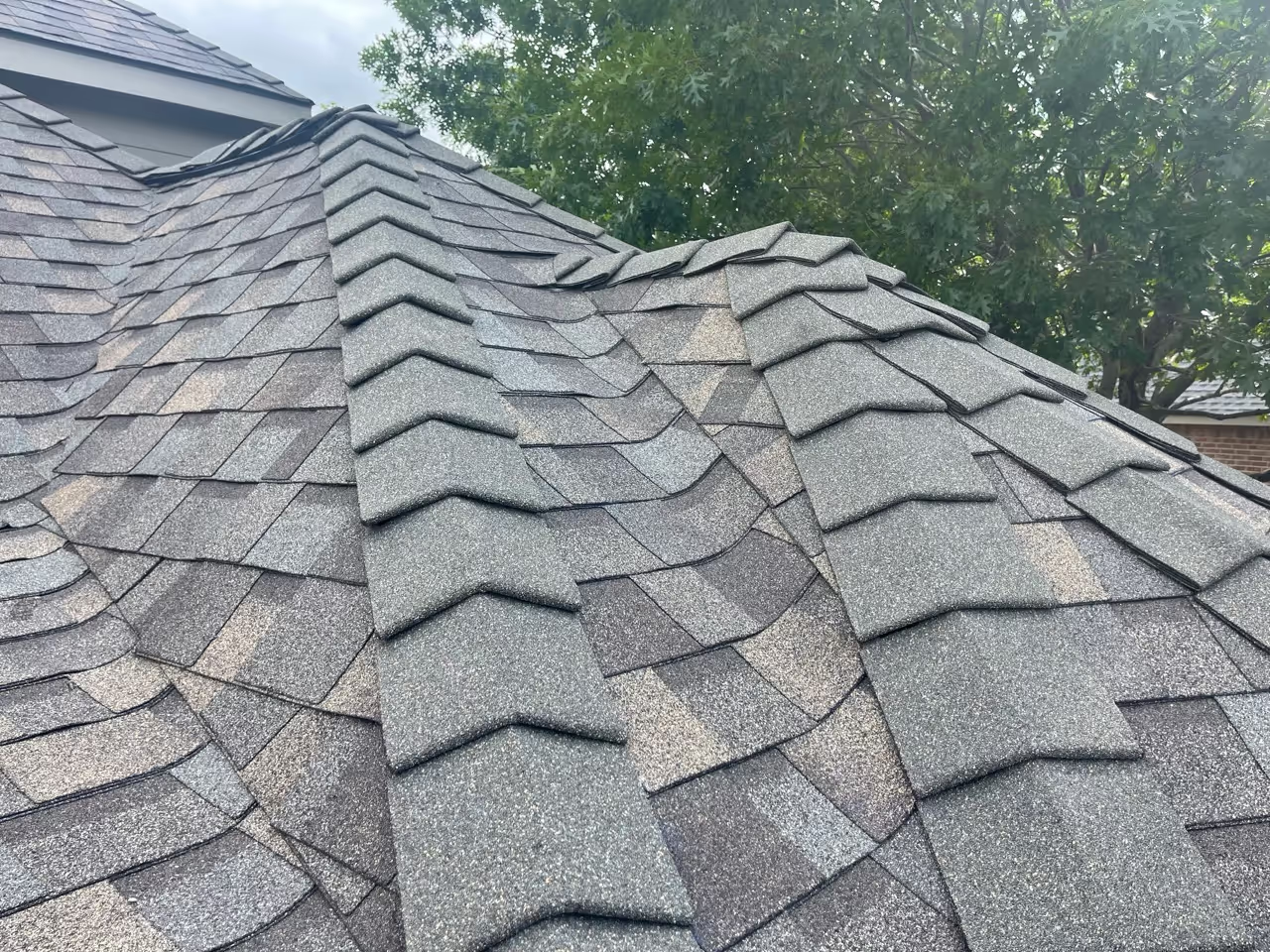View Quick Summary
Texas weather demands tough roofing materials that can handle extreme heat, sudden storms, and massive hail. Phil reveals which materials last longest in DFW's brutal climate and which ones offer the best value for your investment.
Why Texas Climate Destroys Most Roofing Materials
Texas weather doesn't just test your roof. It destroys weak materials and rewards smart choices.
With 100°F+ temperatures for 60+ days annually, sudden temperature swings of 40 degrees in a single day, and baseball-sized hail that can strike any time from March through June, DFW demands materials that laugh at punishment.
After 20+ years installing roofs across Rockwall and DFW, Phil Goodwin knows which materials survive and which ones fail when Texas weather gets serious.
The Texas Weather Challenge
North Texas creates a perfect storm of roof-destroying conditions:
- Extreme heat cycles: Daily temperatures ranging from 45°F to 105°F stress all materials
- UV intensity: Texas sun degrades organic compounds faster than most climates
- Sudden storms: Hail, high winds, and driving rain with little warning
- Humidity fluctuations: Rapid moisture changes cause expansion and contraction
- Winter ice events: Rare but devastating freeze-thaw cycles
Materials that work in moderate climates fail quickly here. You need proven performers designed for extremes.
The Cost of Wrong Material Choices
Choosing the wrong roofing material costs far more than just replacement expenses.
Poor material choices lead to premature failure, insurance claim complications, higher cooling costs, and reduced home values. Smart material selection pays for itself through durability, energy savings, and insurance discounts.
Class 4 Impact Resistant Shingles: The Texas Champion
Class 4 shingles represent the gold standard for Texas roofing, engineered specifically to handle our unique weather challenges.
These premium shingles earn their reputation through rigorous testing and real-world performance in the harshest conditions North Texas can deliver.
What Makes Class 4 Shingles Different
Class 4 designation means shingles survived 2-inch steel ball drops from 20 feet without cracking. This translates to real-world hail resistance up to golf ball size.
Key features that matter in Texas:
- Modified asphalt compounds: Enhanced flexibility prevents cracking in heat
- Reinforced backing: Stronger fiberglass mats resist impact damage
- Advanced granules: Reflective materials reduce heat absorption
- Improved adhesive strips: Better wind resistance for straight-line storms
- Thicker construction: More material means longer lifespan
These upgrades cost 15-25% more initially but deliver superior protection and longevity.
Insurance Benefits of Class 4 Shingles
Most Texas insurance companies offer premium discounts for Class 4 installations:
- State Farm: Up to 19% premium discount
- Allstate: Up to 15% annual savings
- USAA: Up to 12% discount for military families
- Farmers: Varies by location, typically 8-15%
- Liberty Mutual: Up to 10% premium reduction
These discounts often offset the higher material costs within 3-5 years, making Class 4 shingles essentially free upgrades.
Want to maximize your insurance savings? Phil helps DFW homeowners qualify for Class 4 discounts while ensuring proper installation. Call 844-714-7445 for your free material consultation.
Architectural vs. 3-Tab Shingles: The Performance Gap
The choice between architectural and 3-tab shingles affects more than just appearance. It determines how well your roof handles Texas extremes.
Why 3-Tab Shingles Fail in Texas
3-tab shingles represent basic roofing technology that struggles with DFW conditions:
- Thin construction: Less material means faster deterioration
- Single-layer design: No redundancy when damage occurs
- Limited wind resistance: Rated for 60 mph, inadequate for Texas storms
- Poor heat performance: Flat design traps heat against roof deck
- Shorter warranty: Typically 20-25 years vs. 30+ for architectural
While 3-tab shingles cost less initially, replacement frequency makes them more expensive long-term.
Architectural Shingle Advantages
Architectural shingles deliver superior performance through enhanced design:
- Multi-layer construction: Thicker, more durable materials
- Dimensional profile: Better ventilation and heat dissipation
- Stronger wind ratings: Typically 110+ mph resistance
- Enhanced granule technology: Better UV protection and heat reflection
- Longer warranties: 30-50 year coverage with proper installation
Cost Analysis: 20-Year Total Investment
Here's what DFW homeowners actually spend over 20 years:
3-Tab Shingles (2,000 sq ft roof):
- Initial installation: $8,500-$12,000
- Replacement at 15 years: $9,500-$14,000
- Higher cooling costs: $2,400 over 20 years
- Total 20-year cost: $20,400-$28,400
Architectural Shingles (2,000 sq ft roof):
- Initial installation: $11,000-$16,000
- No replacement needed in 20 years
- Energy savings: $1,200 over 20 years
- Total 20-year cost: $9,800-$14,800
Architectural shingles save $10,600-$13,600 over 20 years while providing superior protection.
Metal Roofing: The Long-Term Texas Solution
Metal roofing represents the ultimate Texas weather solution for homeowners planning to stay long-term.
While initial costs are higher, metal's performance in extreme conditions makes it increasingly popular across DFW.
Metal Roofing Performance in Texas Heat
Metal roofing excels in high-temperature conditions through several mechanisms:
- Heat reflection: Reflects 70-90% of solar radiation vs. 20% for asphalt
- Quick cooling: Releases heat rapidly after sunset
- Thermal movement accommodation: Expansion joints handle temperature swings
- Ventilation compatibility: Works perfectly with ridge and soffit ventilation
- No heat buildup: Unlike asphalt, metal doesn't store heat
These properties reduce cooling costs by 15-25% compared to traditional shingles.
Storm Resistance Capabilities
Metal roofing provides superior protection against Texas storms:
- Hail resistance: Dents but rarely punctures, maintaining weatherproofing
- Wind performance: Properly installed metal resists 150+ mph winds
- Impact durability: Bounces back from most impacts without damage
- Fire resistance: Class A fire rating for wildfire protection
- Lightning safety: Conducts electricity safely to ground
Metal Roofing Investment Analysis
Metal roofing requires higher upfront investment but delivers long-term value:
Standing Seam Metal (2,000 sq ft):
- Initial cost: $18,000-$28,000
- Energy savings: $4,000-$6,000 over 20 years
- Insurance discounts: $2,000+ over 20 years
- No replacement costs for 40+ years
- Net 20-year cost: $10,000-$20,000
Metal Tile or Shingle Style (2,000 sq ft):
- Initial cost: $15,000-$22,000
- Similar energy and insurance benefits
- Easier installation reduces labor costs
- Net 20-year cost: $8,000-$15,000
Tile Roofing: Mediterranean Style Meets Texas Durability
Clay and concrete tiles offer excellent Texas performance with distinctive aesthetic appeal.
Popular in upscale DFW neighborhoods, tiles combine old-world charm with modern weather resistance.
Tile Performance in Extreme Conditions
Tile roofing handles Texas weather through thermal mass and durability:
- Heat resistance: Clay and concrete handle 120°F+ surface temperatures
- Thermal mass: Absorbs heat during day, releases slowly at night
- Hail resistance: Concrete tiles especially resist impact damage
- Wind performance: Properly secured tiles resist hurricane-force winds
- UV stability: Colors remain stable for decades in intense sun
Tile Material Comparison
Clay Tiles:
- Natural material with 100+ year lifespan potential
- Excellent heat resistance and insulation
- Higher cost but superior longevity
- Limited color options but authentic appearance
- Requires structural reinforcement for weight
Concrete Tiles:
- More affordable than clay with similar performance
- Wide variety of colors and styles available
- Slightly heavier than clay but easier installation
- Good hail resistance, better than clay
- 50-75 year expected lifespan
Tile Roofing Costs and Considerations
Tile roofing requires significant initial investment and structural considerations:
- Clay tiles: $12,000-$22,000 for 2,000 sq ft
- Concrete tiles: $10,000-$18,000 for 2,000 sq ft
- Structural reinforcement: $2,000-$5,000 additional
- Specialized installation: Higher labor costs due to complexity
- Maintenance requirements: Occasional tile replacement needed
Despite higher costs, tiles often prove economical over 30+ year lifespans.
Considering tile roofing? Phil evaluates structural requirements and helps choose the right tile system for your DFW home. Call 844-714-7445 for expert tile roofing consultation.
Synthetic and Composite Options: Modern Innovation
Advanced synthetic materials combine the best aspects of traditional materials while addressing their weaknesses.
Synthetic Slate and Shake
Modern synthetics replicate premium materials without their drawbacks:
- Weight advantages: 1/4 the weight of natural slate
- Impact resistance: Won't crack or split like natural materials
- Installation ease: Standard fastening techniques work
- Cost benefits: 40-60% less than natural alternatives
- Weather resistance: Engineered for extreme conditions
Quality synthetic materials carry 30-50 year warranties and perform well in Texas conditions.
Rubber and Polymer Shingles
Advanced polymer shingles offer unique benefits for Texas installations:
- Temperature stability: Maintain flexibility from -40°F to 180°F
- Impact absorption: Bend rather than crack under hail impact
- UV resistance: Engineered polymers resist sun damage
- Lightweight design: No structural modifications required
- Recycled content: Environmentally friendly options available
Energy Efficiency: Cool Roofing Technologies
Cool roofing technology significantly reduces cooling costs in Texas heat while improving comfort.
Reflective Shingle Technology
Modern shingles incorporate reflective granules that reduce heat absorption:
- Solar reflectance: Reflects 25-40% of solar energy vs. 5% for standard shingles
- Thermal emittance: Releases absorbed heat more efficiently
- Surface temperature reduction: 10-15°F cooler roof temperatures
- Attic temperature benefits: 5-10°F lower attic temperatures
- HVAC load reduction: Less strain on air conditioning systems
Cool Roof Performance Data
Texas homes with cool roofing see measurable benefits:
- Cooling cost reduction: 7-15% lower summer electric bills
- Peak demand reduction: Smaller AC units can maintain comfort
- Equipment longevity: Less HVAC stress extends system life
- Comfort improvement: More even temperatures throughout home
- Environmental benefits: Reduced urban heat island effect
Installation Quality: Why Material Choice Alone Isn't Enough
The best materials fail without proper installation. Texas conditions demand installation excellence to achieve rated performance.
Critical Installation Factors
Proper installation requires attention to Texas-specific details:
- Ventilation design: Adequate intake and exhaust for heat management
- Fastening patterns: Enhanced attachment for wind resistance
- Underlayment selection: Synthetic materials for heat resistance
- Flashing details: Waterproofing around penetrations and edges
- Expansion accommodation: Allowing for thermal movement
Warranty Protection
Manufacturer warranties require proper installation by certified contractors:
- Material defect coverage: Protects against manufacturing problems
- Installation warranties: Covers workmanship issues
- Wind damage protection: Enhanced coverage with proper installation
- Transferable benefits: Warranties that transfer to new owners
- Local climate certification: Installers trained for Texas conditions
Making the Right Choice: Decision Framework
Selecting optimal roofing materials requires balancing performance, cost, and personal priorities.
Budget-Conscious Best Choices
For homeowners prioritizing initial cost:
- Architectural shingles with reflective granules
- Class 4 rating for insurance discounts
- 30-year warranty minimum
- Energy Star qualification for rebates
- Professional installation with full warranty
Premium Performance Choices
For maximum durability and long-term value:
- Standing seam metal roofing
- Class 4 architectural shingles as alternative
- Enhanced ventilation systems
- Premium underlayment materials
- Extended warranty coverage
Climate-Specific Priorities
Texas conditions emphasize specific material properties:
- Impact resistance: Essential for hail protection
- Heat reflection: Critical for cooling cost control
- Wind resistance: Important for storm survival
- UV stability: Necessary for color retention
- Thermal cycling durability: Handles temperature extremes
Timing Your Material Selection
Strategic timing of material selection and installation can save money and ensure availability.
Seasonal Considerations
Different seasons offer advantages for various materials:
- Fall installation: Best pricing and contractor availability
- Winter planning: Time to research and secure materials
- Early spring preparation: Install before storm season arrives
- Summer limitations: Heat affects installation quality
- Post-storm periods: Limited materials and inflated pricing
Market Conditions
Material costs fluctuate based on supply and demand:
- Commodity pricing: Oil prices affect asphalt shingle costs
- Manufacturing capacity: Storm damage creates supply shortages
- Transportation costs: Fuel prices impact delivered pricing
- Seasonal demand: Spring storms drive up all material costs
- Technology updates: New products may offer better value
Take Action: Protect Your Investment
Your roof represents one of your home's most important systems. Don't trust it to substandard materials or inexperienced installers.
Texas weather will test whatever you install. Choose materials and contractors that welcome that challenge and deliver lasting protection.
Phil Goodwin has installed every type of roofing material across DFW's diverse neighborhoods and weather conditions. His experience reveals which materials truly perform and which ones disappoint when Texas weather turns serious.
Don't gamble with your family's protection. Get expert guidance that considers your specific home, budget, and long-term goals.
Ready to choose the perfect roofing material for your Texas home? Phil provides comprehensive material consultations including cost analysis, performance comparisons, and installation planning. Call 844-714-7445 now for your free roofing material evaluation and discover which option delivers the best value for your specific situation.
Check Out Some Of Our Other Blogs

Get Your Free Storm Damage Inspection
Don't wait for small roof problems to become expensive disasters. We'll inspect your roof completely free and show you exactly what needs attention. If we find storm damage, we'll help you get it covered by insurance. If your roof is fine, you'll have peace of mind.




